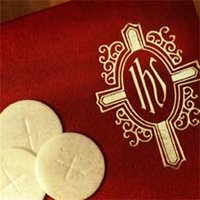 Who is Worthy of Holy Communion?
Who is Worthy of Holy Communion?By Lisa Haddock
NJ Faith Forum Editor
Since 2002, stories about priests sexually abusing children and young people have flooded the news. These men were often returned to ministry after counseling. All too frequently, they also returned to committing grave crimes against children -- even as they celebrated the Eucharist.
The Eucharist is the heart of the Catholic faith. The Second Vatican Council described this Sacrament as “the source and summit of Christian life.” Broadly stated, those who receive Communion and celebrate Mass must be in a state of moral worthiness.
According to Catholic teaching, the bread and wine consecrated at Mass are mystically transformed into the Body and Blood of Christ (Catechism of the Catholic Church, 1333). Priests stand at the altar in the person of Christ (Catechism, 1548). By invoking the Holy Spirit, they consecrate wafers and wine into the Body and Blood of Christ.
Because of the holiness and centrality of this Sacrament, the Church sets precise rules for who can receive Communion.
According to the Church’s Code of Canon Law (916): “A person who is conscious of grave sin
is not to celebrate Mass or receive the body of the Lord without previous sacramental confession unless there is a grave reason and there is no opportunity to confess.” [Emphasis mine.]
Canon 1395, Paragraph 2, states that a cleric who has committed a sexual offense “by force or threats or publicly or with a minor below the age of sixteen years, is to be punished with just penalties, not excluding dismissal from the clerical state if the case so warrants.”
Read
more of this article.
Current Faith Issues and Controversies
Complete Blog Index




